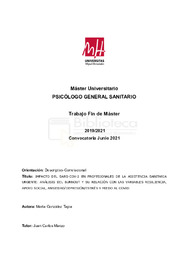Resumen :
El objetivo del presente estudio ha sido evaluar el impacto emocional del SARS-CoV-2 en
profesionales de la emergencia sanitaria y analizar su relación con el burnout y las variables de
ansiedad/depresión/estrés, miedo al COVID, resiliencia, apoyo social y clima laboral. La muestra
estuvo formada por 27 participantes y la selección se realiza mediante muestreo no probabilístico
de bola de nieve. El diseño utilizado fue de tipo transversal y descriptivo-correlacional. A la
muestra se accede a través de internet, se recopilan datos usando una encuesta en línea a través de
Google Formularios. Para el diagnóstico de la situación y la detección de necesidades de
participación se ha evaluado a los participantes con el cuestionario CESQT, la Escala MOS, la
Escala DASS-21, la Escala de Resiliencia de 14 ítems, la Escala CLIOR de Clima laboral, la escala
de Miedo al COVID y varias preguntas de tipo ad hoc para medir las variables sociodemográficas
y laborales. Se ha analizado la información mediante SPSS 22.0 y Excel 13.0. Tras analizar los
resultados mediante correlaciones de Pearson se consigue afirmar la existencia de relaciones
significativas positivas entre burnout y depresión/estrés y negativas entre síndrome de Burnout y
resiliencia, por otro lado, se confirmó la relación positiva entre miedo al COVID y ansiedad/estrés,
por lo que se concluye que es importante implementar en las organizaciones programas de
bienestar para mejorar la salud física y psicológica de los profesionales sanitarios.
The objective of this study was to evaluate the emotional impact of SARS-CoV-2 in health
emergency professionals and to analyze its relationship with burnout and the variables of anxiety
/ depression / stress, fear of COVID, resilience, social support and climate. labor. The sample
consisted of 27 participants and the selection is made by non-probabilistic snowball sampling. The
design used was cross-sectional and descriptive-correlational. The sample is accessed through the
internet, data is collected using an online survey through Google Forms. For the diagnosis of the
situation and the detection of participation needs, the participants were evaluated with the CESQT
questionnaire, the MOS Scale, the DASS-21 Scale, the 14-item Resilience Scale, the CLIOR
Workplace Climate Scale, the Fear of COVID scale and several ad hoc questions to measure
sociodemographic and labor variables. The information has been analyzed using SPSS 22.0 and
Excel 13.0. After analyzing the results using Pearson's correlations, the existence of significant
positive relationships between burnout and depression / stress and negative relationships between
Burnout syndrome and resilience was confirmed, on the other hand, the positive relationship
between fear of COVID and anxiety / stress was confirmed, for which concludes that it is important
to implement wellness programs in organizations to improve the physical and psychological health
of health professionals.
|
 La licencia se describe como: Atribución-NonComercial-NoDerivada 4.0 Internacional.
La licencia se describe como: Atribución-NonComercial-NoDerivada 4.0 Internacional.
.png)
